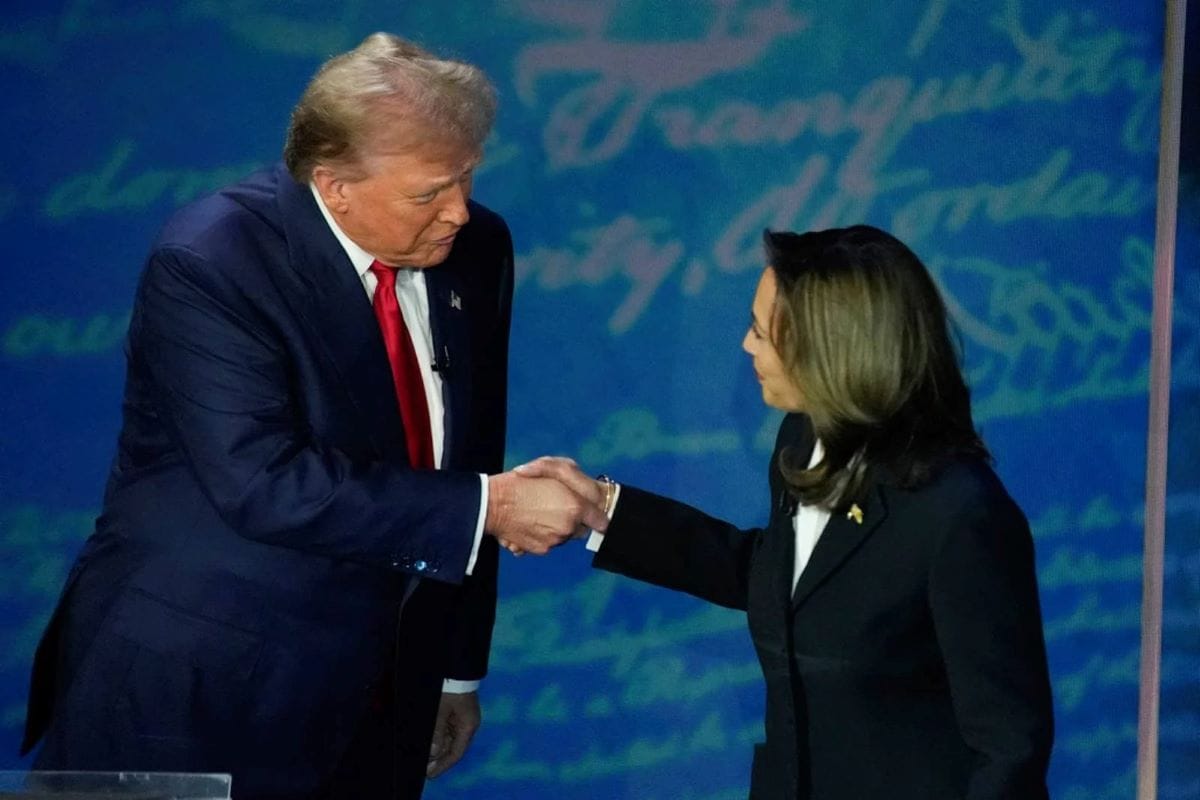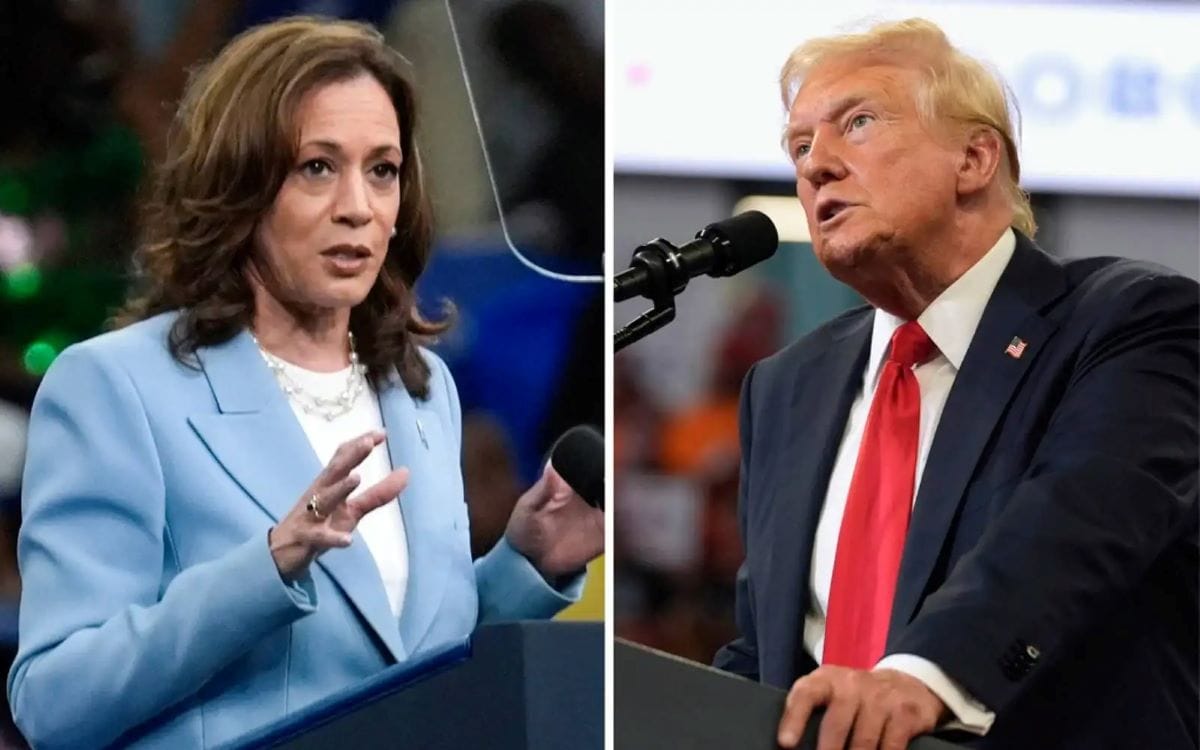As the United States heads toward the November 2024 election, the race between Republican candidate Donald Trump and Democratic candidate Kamala Harris has evolved into a defining moment for American politics.
Both candidates bring distinct policies, from economic and social reforms to immigration and foreign relations. Here’s an in-depth look at where each stands on key issues and which policies sway voter opinion.

Economic Policy: Trump’s Growth-Driven Strategy vs. Harris’s Social Safety Net
For voters in 2024, economic issues top the list of concerns. Inflation, recession fears, job security, and tax reforms are at the center of this year’s election discourse. Donald Trump’s platform, which emphasizes reduced corporate taxes, deregulation, and job creation, has strong appeal among those prioritizing economic stability and growth.
His track record in office saw tax cuts and low unemployment, which he uses to assert his economic acumen. Trump’s messaging resonates particularly with middle- and upper-income voters and business owners who fear potential regulatory changes under Harris
Kamala Harris, in contrast, leans on economic equality and the expansion of the social safety net. Her economic policy focuses on raising the minimum wage, increasing access to affordable housing, and strengthening healthcare benefits for low- and middle-income families. Harris emphasizes tax cuts for the middle class, arguing that they support upward mobility.
Her platform also includes a strong focus on climate-related jobs, aiming to pivot the U.S. economy toward renewable energy. While her approach resonates with working-class and progressive voters, there are concerns among moderates that her policies could lead to increased government spending and potential tax hikes.
Public Opinion and Polls: Trump leads Harris on economic confidence, with polls indicating a slight majority of Americans trust him to manage economic issues more effectively. Voters in critical swing states report more confidence in Trump’s ability to curb inflation and support job growth, although Harris’s focus on economic equity gains traction among younger and urban voters.
Immigration: A Policy Divide Between Strict Regulation and Inclusive Reform
Immigration policy has intensified in recent years, especially among Republican voters. Trump advocates for stringent border control and a reduction in immigration, stressing a firm stance on security and employment protection for American citizens. His policy includes increasing funding for border enforcement and limiting the number of visas and work permits available to non-U.S. citizens
Harris, however, champions an immigration overhaul that aims to create a streamlined pathway to citizenship, protect DACA recipients, and provide humane border control measures. She has promised to address the root causes of immigration, including conditions in Latin American countries that drive people to seek asylum in the U.S. Harris’s approach appeals to voters interested in social equity and human rights but faces opposition from those concerned about potential security and economic impacts
Voter Sentiment: This policy divide is most pronounced among partisan voters, with 82% of Trump supporters citing immigration as a top concern, compared to about 39% of Harris supporters. Polls show that Trump maintains a 7-point lead over Harris on immigration, reflecting his alignment with conservative views on security
Healthcare and Social Policies: Public Health, Abortion, and Race
Healthcare policy differences are significant, especially following the Supreme Court’s decision to overturn Roe v. Wade, which has placed abortion rights at the forefront of Harris’s campaign. She supports legislation to protect abortion rights, along with expanded access to healthcare for all Americans through subsidized plans. Harris’s focus on these issues appeals strongly to women, younger voters, and urban residents who prioritize reproductive rights and equitable healthcare access
Trump, however, emphasizes deregulation in healthcare, supporting policies that would allow private markets to have a more significant role in determining healthcare costs and coverage options. His healthcare platform also includes measures aimed at reducing prescription drug prices and increasing competition among providers. While he has voiced opposition to federal mandates on healthcare, Trump has less concrete policies on abortion, focusing instead on appealing to conservative and religious voters who support a pro-life agenda.
Current Polls: Harris’s stance on abortion resonates with a large portion of Democratic voters, with 67% of her supporters prioritizing this issue. Polls show a nearly equal divide between candidates on healthcare, though Harris has a slight lead in voter confidence on this matter. Racial justice is another domain where Harris garners more support, with her policies focused on addressing systemic inequalities appealing to a broad base of Democratic voters.
Foreign Policy and Defense: “America First” vs. Global Diplomacy
Foreign policy remains crucial, with Trump focusing on “America First” to emphasize U.S. independence from foreign entanglements and a strong national defense. He has advocated for trade policies that prioritize American manufacturing, with a focus on curtailing China’s influence and renegotiating trade agreements. His stance appeals to voters worried about China’s economic and military expansion
Conversely, Harris promotes a more diplomatic approach, aiming to strengthen international alliances and support collaborative efforts to address global challenges, including climate change. Her foreign policy aligns closely with progressive voters and those in favor of international engagement over isolationism. Harris has also emphasized rebuilding relationships with NATO allies and upholding human rights internationally.
Public Perception: Polls show that Trump holds a lead on handling foreign affairs and defense, particularly among those who prioritize military strength. However, Harris’s approach resonates among voters who value international cooperation and multilateral solutions. With international relations increasingly impacting domestic policy, this divide underscores each candidate’s distinct approach to America’s role on the global stage
Law Enforcement and Criminal Justice Reform
Law enforcement is another critical issue, with Trump’s policy advocating a “tough on crime” approach, focusing on supporting police forces and cracking down on violent crime. His stance finds favor among rural and suburban voters who view crime rates as a top concern and are generally opposed to police reform. Trump argues that law and order are essential to American society and paints Harris’s policies as too lenient
Harris supports criminal justice reform, advocating for community policing, reduced incarceration for non-violent offenses, and improved oversight of police misconduct. Her policies attract voters interested in addressing systemic issues in law enforcement and creating a fairer justice system, though they face criticism from those fearing they may result in lax enforcement.
Public Confidence: Voters are nearly evenly split in their confidence regarding each candidate’s ability to handle law enforcement issues, with Trump holding a slight lead. His support base includes those who fear rising crime, whereas Harris’s support comes from voters who see criminal justice reform as a path to social equity
Polls and Swing State Dynamics
Polling data reveals a highly competitive race, with each candidate finding strong support in certain demographics and geographic areas. Trump’s base largely includes rural and suburban voters, particularly in Southern and Midwest states. Harris, however, has significant backing in urban areas, the Northeast, and among younger voters and minorities.
Swing states, including Pennsylvania, Arizona, and Wisconsin, are currently too close to call, with polls indicating a nearly even split in voter preference. While Trump has an edge on economic and immigration issues, Harris is favored for her positions on healthcare and social policies. Both campaigns will likely focus on these battleground states as election day nears
Read more blogs on current affairs, Kamala Harris, US Presidential Election
In summary, the 2024 election remains fiercely contested, with each candidate embodying starkly different visions for the country. With the economy, immigration, healthcare, and foreign policy as pivotal issues, American voters have crucial decisions to make. As candidates refine their stances to capture undecided voters, every issue could play a pivotal role in shaping the future of the United States.
References:
https://www.politico.com/live-updates/2024/10/24/2024-elections-live-coverage-updates-analysis
https://www.pewresearch.org/politics/2024/09/09/issues-and-the-2024-election
Enjoyed this article?
If you find the blogs helpful, you can support Chatterlane with a small contribution. Even a cup of coffee helps me continue creating useful, well-researched content.


Comments
5 responses to “Who Will Shape America’s Future? 2024 U.S. Election Analysis”
[…] into the candidates, issues, and potential future impacts, check out our comprehensive analysis, Who Will Shape America’s Future? 2024 U.S. Election Analysis. This piece explores the pivotal forces shaping America’s path forward—don’t miss […]
Hello, you used to write fantastic, but the last several posts have been kinda boringK I miss your great writings. Past several posts are just a bit out of track! come on!
[…] Immigration policies have played a crucial role in shaping voter opinions in the recent US elections. To understand their impact on election results and the future of American leadership, check out our previous blog ‘Who Will Shape America’s Future? 2024 U.S. Election Analysis’. […]
I’m extremely inspired along with your writing skills and also with the format in your weblog.
Is that this a paid theme or did you modify it yourself?
Either way stay up the excellent quality writing, it’s rare
to look a great blog like this one today. Snipfeed!
[…] 🔗 Who Will Shape America’s Future? 2024 U.S. Election Analysis […]